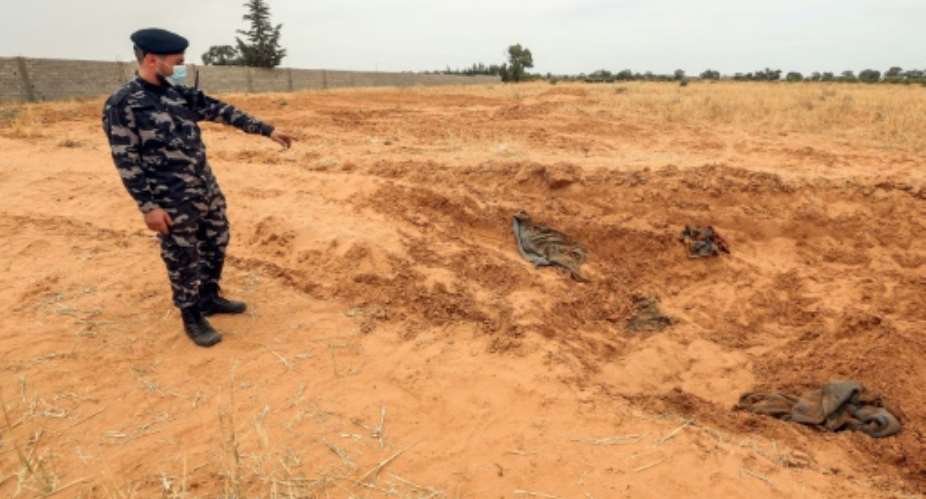Human Rights Watch called on Libyan military strongman Khalifa Haftar on Tuesday to investigate alleged war crimes by his fighters after the discovery of mass graves in territory formerly under their control.
The New York-based watchdog said it had yet to receive an answer from Haftar's Libyan Arab Armed Forces to a previous request for information about footage posted on social media last month that appeared to show summary executions and desecration of corpses by his men.
"Haftar needs to urgently hold his forces accountable for any war crimes they are committing and apparently advertising online," HRW's senior Libya researcher Hanan Salah said.
"Senior LAAF leadership has ignored these crimes, but they should be held accountable by domestic and international courts for complicity in abuses."
The allegations have taken on new momentum after forces of Libya's UN-recognised unity government drove Haftar's fighters out of all their remaining positions in the west in recent weeks.
Government forces say they have discovered eight suspected mass graves, most of them in and around the town of Tarhuna, southeast of Tripoli, which served as the main staging point for Haftar's abortive 14-month offensive against the capital.
The United Nations Support Mission in Libya expressed "horror" at the discovery and welcomed a decision by the Government of National Accord to establish a committee to investigate the finds.
An AFP journalist on Thursday was granted access to a site where several bodies had been discovered and exhumed by the Libyan Red Crescent for identification the day before.
Scraps of clothing were scattered around the site near graves covered with fresh soil.
Separately, 160 bodies were discovered in the mortuary of Tarhuna's public hospital, according to its director Aburawi al-Buzeidi.
It is not the first time that Haftar's loyalists have faced allegations of war crimes.
 The International Criminal Court issued an arrest warrant for Haftar commander Mahmoud al-Werfalli in 2017 over similar alleged crimes in Libya's second city Benghazi but he remains at large. By - (ICC-CPI/AFP/File)
The International Criminal Court issued an arrest warrant for Haftar commander Mahmoud al-Werfalli in 2017 over similar alleged crimes in Libya's second city Benghazi but he remains at large. By - (ICC-CPI/AFP/File)
In 2017 and 2018, the International Criminal Court issued warrants for the arrest of a LAAF commander, Mahmoud al-Werfalli, for his role in a series of extra-judicial executions and desecration of fighters' corpses in Libya's second city Benghazi. He remains at large.
Libya has endured years of violence since a NATO-backed uprising toppled and killed longtime dictator Moamer Kadhafi in 2011, with rival administrations and scores of militias battling for power.
The GNA controls the west, including the capital Tripoli, while Haftar's LAAF holds the east and some of the far-flung oases and oilfields that dot the south.
The United Nations has urged outside powers to respect a deal reached at a January conference in Berlin upholding a much-violated arms embargo, but so far it has had little visible effect.
While the GNA is backed by Turkey and its ally Qatar, Haftar is supported by Russia and the United Arab Emirates as well as Egypt.





 Meta releases new version of conversational AI across its platforms
Meta releases new version of conversational AI across its platforms
 Cape Town named Africa’s Best Airport 2024 by Skytrax
Cape Town named Africa’s Best Airport 2024 by Skytrax
 Bono East: Four injured after hearse transporting corpse crashes into a truck
Bono East: Four injured after hearse transporting corpse crashes into a truck
 ‘Be courageous, find your voice to defend our democracy’ — Sam Jonah urges journ...
‘Be courageous, find your voice to defend our democracy’ — Sam Jonah urges journ...
 Exodus of doctors, nurses and teachers have worsened because of unserious Akufo-...
Exodus of doctors, nurses and teachers have worsened because of unserious Akufo-...
 2024 election: Avoid insults, cutting down people in search of power – National ...
2024 election: Avoid insults, cutting down people in search of power – National ...
 ‘You passed through the back door but congratulations’ — Atubiga on Prof Jane Na...
‘You passed through the back door but congratulations’ — Atubiga on Prof Jane Na...
 Government’s $21.1 billion added to the stock of public debt has been spent judi...
Government’s $21.1 billion added to the stock of public debt has been spent judi...
 Akufo-Addo will soon relocate Mahama’s Ridge Hospital to Kumasi for recommission...
Akufo-Addo will soon relocate Mahama’s Ridge Hospital to Kumasi for recommission...
 We must not compromise on our defence of national interest; this is the time to ...
We must not compromise on our defence of national interest; this is the time to ...
